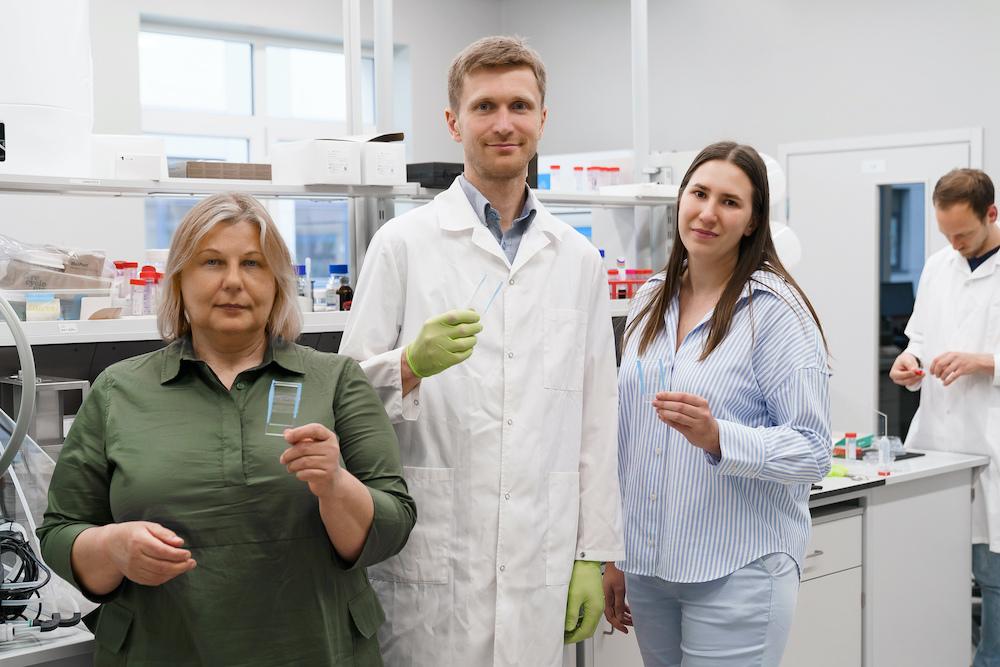The biomedical start-up "PrintyMed" has attracted two grants from the Competence Center for Smart Materials, the total amount of which exceeds 800 thousand euros. It is planned that the implementation of these projects will start sales activities in the next year.
So far, PrintyMed has already attracted various grants. Including the initial investments in research, two million euros have been invested in the development of the technology. Also, the company won the third place in the innovative ideas competition "Ideju kaus 2023". As a start-up company, "PrintyMed" is always looking for opportunities to attract investments - even now.
Working on a prosthetic heart valve
One of the grants is for the development of prosthetic heart valves using artificial spider silk. This project aims to develop a manufacturing method and a prototype heart valve prosthesis, to create a new technology to be able to print artificial spider silk while preserving its biological properties, as well as to evaluate the biomedical properties of artificial spider silk. The total amount of this project is 447.2 thousand euros.
"PrintyMed" co-founder Ekaterina Romanova says that 1/3 of global deaths are related to cardiovascular diseases. To save people's lives, more than 300 thousand heart valve replacement operations are performed every year. It is predicted that this number will increase to 500 thousand within a few years. Each year, approximately 6,000 organs are available for transplantation, but 100,000 people are already waiting for an organ transplant - every 10 minutes, another person joins them. 22 people die every day while waiting, but even when a patient gets to a transplant, there is a high risk of organ rejection due to an autoimmune reaction.
"Our prosthetic heart valves from spider silk will not cause rejection processes in the human body, so it is suitable for creating artificial organs in 3D bioprinters. This is also our most ambitious goal, which this grant will help to achieve. Of course, there is still a long way to go before that - at least three to five years," says J. Romanova.
Currently, PrintyMed has developed a prototype heart valve from artificial spider silk, which is the simplest "part" of the heart. It has been tested on rat blood and found that the valve is working.
Researches new membranes
One of the options to get to the market faster is cooperation with the domestic startup "Cellbox Labs", which develops organs on a chip. Therefore, the second grant is for the development of a cell-binding membrane that could be used in organs on a chip. In this project, the amount of the grant is 362.7 thousand euros.
J. Romanova can say that the global organ-on-a-chip market in 2023 was 68.63 billion dollars. It is projected to reach $448.92 billion by 2031. The main reason for this increase is the requirement to use organs-on-a-chip instead of animals for screening new drugs, as well as the use of this technology in studies of human disease models that require the reproduction of multi-organ microchips.
“Due to increasing demand, organ-on-a-chip companies are actively looking for alternative membrane materials that could be successfully used in multi-organ-on-chips. "Artificial spider silk is a biocompatible material with a high ability to attract cells, so it is particularly suitable for creating a membrane that will ensure the creation of new and more complicated organs on a chip," she says.
Explores opportunities in the cosmetics industry as well
Artificial spider silk can also be used in liquid form, but then it has other properties. In this form, it is like a hydrogel, which could be used, for example, in the treatment of wounds or in the production of restorative cosmetics. J. Romanova explains that from the point of view of regulatory requirements, cosmetics is a relatively simple industry to enter with a new ingredient, but the market is very saturated and the competition is huge.
"We are aware of our capacity and are analyzing in which direction we can get a higher return with less investment and start selling. Currently, they are membranes," says J. Romanova.
Mimics the process of how spider silk is "produced" in nature
"PrintyMed" from the technology developed at the Latvian Institute of Organic Synthesis has created artificial spider silk in a biomimetic way, imitating the process as it happens in nature. "In the laboratory, there are bacteria that produce the protein and then, using the bioconjugation method, imitate the process of how a spider "produces" silk. Although PrintyMed's method does not use animals, the company mimics all the processes in the laboratory exactly as a spider would.
The artificial spider silk produced in Latvia differs in the method by which it is obtained and the properties of the material. J. Romanova explains that other producers of artificial spider silk obtain it from chemicals by combining them in the right way. In this case, the artificial spider silk produced by the chemical method is not compatible with the human body, so it cannot be used in implants, valves, etc.
PrintyMed's production volume at one time is up to 10 grams of artificial spider silk. Although the volume is small, J. Romanova explains that it is already a giant step forward. Further scaling up the technology to produce 100 or 1000 grams of this feedstock will be easier.
Photo: PrintyMed Publicity photo: founders Sandra Treide, Kristaps Jaudzems and Ekaterina Romanova
